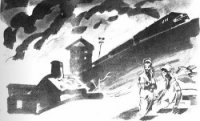Operation Nemesis: The Assassination Plot that Avenged the Armenian Genocide - Bogosian Eric (читать книги полностью без сокращений txt) 📗
The immensity of the Armenian Genocide is beyond conception. How can human beings commit such atrocities? The crime defies an answer. What we do know is that such a crime against humanity must be reacted to and that it must be memorialized. Thus Operation Nemesis. Though the men and women of Operation Nemesis broke the laws of man, they did so to bring some portion of sanity to an insane world. The unthinkable actually cannot be answered, but in the case of Armen Garo, Shahan Natali, Soghomon Tehlirian, and others, to act was the only way to continue living. Otherwise they too would have been consumed by the insanity.
The Nemesis fedayeen did not see themselves as terrorists. From their point of view, their actions were driven by motives that far surpassed simple retribution or revenge. As holy warriors, they believed their domain to be spiritual, not political. Their job was to exact some fraction of justice. In other words, killing Talat Pasha, Djemal Pasha, Behaeddin Shakir, and Said Halim Pasha was an attempt to bring some kind of balance to the universe. The CUP leadership, in the eyes of Garo and Natali, had evaded just punishment for mass murder. Though the perpetrators were convicted by a court of law in Constantinople, those convictions were later thrown out by the new Ankara government. A new Turkish regime was taking shape, and it was clear that the men who had organized and carried out the genocide would participate in it. To let these men walk free would be wrong in the deepest sense.
That does not make what Operation Nemesis did legal. One question that surrounds these assassinations is this: If you desire a world where justice prevails, then you must rely on laws. If you rely on laws, they must be universal. Laws cannot be superseded simply because some feel that they are wrong or because a person “knows” he has the right to break them. We live in a world where we attempt to achieve consistency in rule of law. The concept of “law” demands it. Yet the men and women of Operation Nemesis did what governments could not. They were appealing to a higher, final justice. One that exists somewhere between heaven and earth.
My grandfather told me stories from his life. It was his gift to me. Memory lies at the center of the Nemesis story. It is the engine of an intense bloodlust. We remember, but we remember differently. Our respective narratives lead to different actions. Thus the conundrum of history. Were you there? Did you actually see it? Who told you about it? How can you be sure?
Operation Nemesis is only one link in a historical chain that began long before its actors were born and that continues to this day. The Hamidian massacres of the late nineteenth century gave birth to Armenian revolutionary groups that fought the Ottoman government in eastern Anatolia. The Ottoman government under the Young Turks, shrouded by the fog of war, used this activity as a justification for liquidating an entire indigenous population. And though tribunals were held after the war, little was done in the end to bring the perpetrators to justice. Operation Nemesis was born and carried out its mandate. And then, a half century after the genocide, as the Turkish government persisted in its refusal to acknowledge one of the greatest mass murders in history, a new generation rose up and initiated an anarchic string of assassinations. In 2007 one more link in the chain was forged with the tragic assassination of the Armenian Turkish editor Hrant Dink.
And so memory and retribution are linked. But why? Why is it so important to remember what happened? All people who live will die someday, and in a few generations most of us will be forgotten altogether, so why does it make any difference whether the details of our particular deaths are remembered, violent or not? Perhaps the answer lies in the very fact that we do all die, that no one cheats death. We come into this world with nothing and we leave with nothing. We all know, either implicitly or explicitly, that all we really have is our place in the memories of others. We exist to the degree that we know and remember one another. Even the most isolated among us. We share a collective understanding that we are all part of a greater whole. Perhaps we will not be remembered as individuals, but we, the living, move through life surrounded by what the dead have left for us. The dead live on in the pages of thousands of books, in the bricks of countless buildings, in the flickering shadows of old movies, in virtually everything we see and touch, including our own children.
For this reason, we must respect the dead. It is this contract of respect we have with those who have gone before us that demands we acknowledge how they died and, if they died violently, to seek redress. The question that is almost impossible to answer is what should we do if those who committed the original crime go unpunished? What if those who follow in the footsteps of those who committed the original crime insist on hiding the truth? What then? In the end, is there such a thing as justice?
This book is an attempt to meditate on an answer, not only by providing the facts as best we know them, but also by research and authorship, and through your willingness to read what I have to offer. In that way we honor those hundreds of thousands who were condemned to anonymous death and burial, whose memory lasts only as long as our memories do.
POSTSCRIPT
The year 2015 marks one hundred years since Talat Pasha and the CUP ruled over the last days of the Ottoman Empire. One hundred years ago, millions of Armenians lived in Asia Minor. Today, fewer than ninety thousand people living in Turkey call themselves Armenian. In many ways, the destruction of the Christians in the Ottoman Empire began a trend. Throughout the Middle East, fewer and fewer Christians make their home where Islam is the majority religion. Year by year, Turkey plays a greater role as a major representative of the United States in the Middle East. Turkey is now considered to be an irreplaceable component of American foreign policy. The Turkish government has more than enough incentive to remain silent about the genocide of one hundred years ago.
Whether Turkey wants to be part of the European Union or not, it binds itself ever more tightly to the West with each passing year. What began as a military relationship has become a deeply economic one, and that in turn has affected civic life in Turkey. The institutions of the republic, particularly its university system and judiciary, as well as its social life, can no longer exist in concert with manufactured history. The truth is easily accessible, and Turkish scholars and writers, young people using social media, anyone watching television, must in time be exposed to it, despite the law forbidding discussion of the genocide. Some brave souls are writing about it and investigating it. The tide of truth is rising.
A rising tide floats all boats. And that includes the full history of the Armenians who lived within and outside the Ottoman Empire. The Armenian Genocide is a part of that history, but so is the story of the Armenian revolutionary groups and their actions. And so are the contributions Armenians made for centuries to Ottoman civilization. And so is Operation Nemesis. We can only hope that serious scholars will someday be allowed to enter the shuttered archives, Turkish and Armenian, to uncover the memories we’re losing, the history we’ve lost, including the full and complete story of this brave group of men possessed of remarkable will and courage.




